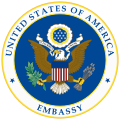| Embassy of the United States, Pristina | |
|---|---|
  | |
 | |
| Location | |
| Address | Arberia/Dragodan, Rr. 4 KORRIKU Nr.25 Pristina, Kosovo |
| Coordinates | 42°39′43″N21°9′0″E / 42.66194°N 21.15000°E |
| Website | xk |
The Embassy of the United States in Pristina is the diplomatic mission of the United States of America in Kosovo.